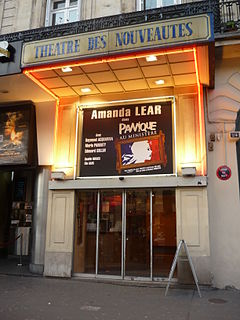Salle de la Bourse
| Théâtre des Nouveautés | |
|---|---|

Théâtre des Nouveautés in 2010
|
|
| General information | |
| Address | 24 boulevard Poissonnière, Paris 9th arr., France |
| Coordinates | 48°52′17″N 2°20′41″E / 48.8713°N 2.3448°E |
| Inaugurated | 1921 |
| Other information | |
| Seating capacity | 585 |
| Website | |
| www |
|
The name Théâtre des Nouveautés ("Theatre of the New") has been used successively to refer to several different Parisian theatre companies and their buildings, beginning in 1827. The current theatre (pictured) was built in 1921 and is located at 24 boulevard Poissonnière (Paris, 9th arr.).
The name was used for three different companies prior to inauguration of the current company in 1921.
The first Théâtre des Nouveautés opened on 10 March 1827 in the Salle de la Bourse (capacity 1250) located on the rue Vivienne, (Paris 2nd arr.) across from the Paris Bourse. The founder was Cyprien Bérard, a former director of the Théâtre du Vaudeville. The programs consisted of ballads, opéras comiques (Hector Berlioz was a chorister there for a few months), satires and political plays. The theatre suffered the prohibitions of censorship and had recurrent difficulties with the Opéra-Comique, which refused to share its privileges. However, for other reasons Bérard was forced to close his theatre on 15 February 1832.
By chance the Opéra-Comique, which had been bankrupted by the exorbitant rents at the Salle Ventadour, left that theatre and on 24 September 1832 opened at the Salle de la Bourse, which was often still referred to as the Théâtre des Nouveautés. The Opéra-Comique remained at the theatre for almost eight years, and the premieres of Hérold's Ludovic and Le pré aux clercs, Adam's Le chalet and Le postillon de Lonjumeau, Halévy's L'éclair, Auber's L'ambassadrice and Le domino noir, and Donizetti's La fille du régiment were all given there. The company's last performance in the theatre was on 30 April 1840, after which it moved to the new (second) Salle Favart.
...
Wikipedia
